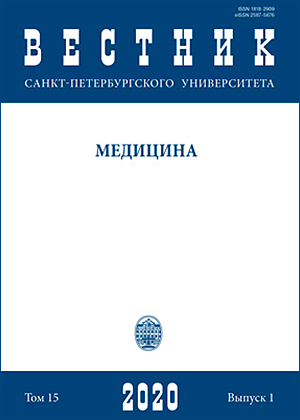Gender characteristics of autoimmune hypogonadism
DOI:
https://doi.org/10.21638/spbu11.2020.102Аннотация
Autoimmune gonadal lesions represent a highly heterogenous conditions affecting men and women of reproductive age and resulting in loss of endocrine function and, eventually, infertility. Well-known and well-documented risk factors exist, and the presence or suspicion of autoimmune disorder should be regarded as an important one. For the purpose of the present study, ELISA kits according to the proprietary technology for detection of antitesticular and antiovarian antibodies were developed. Among men with autoimmune orchitis an increased level of antibodies to steroid-producing testicular cells, decreased serum total and free testosterone and altered semen parameters were found. Combined autoimmune diseases were present (autoimmune thyroiditis, vitiligo, type 1 diabetes) in 13.5 % of cases. In women with autoimmune oophoritis the main finding was anovulation with preserved serum FSH and LH levels (91.6 %) and luteal insufficiency (8.4 %). In total, 19.4 % of patients had other autoimmune diseases (autoimmune thyroiditis, vitiligo, chronic autoimmune hepatitis, rheumatoid arthritis, systemic lupus erythematosus).
Ключевые слова:
antiovarian antibodies, antitesticular antibodies, ovarian insufficiency, hypogonadism
Скачивания
Библиографические ссылки
References
Загрузки
Опубликован
Как цитировать
Выпуск
Раздел
Лицензия
Статьи журнала «Вестник Санкт-Петербургского университета. Медицина» находятся в открытом доступе и распространяются в соответствии с условиями Лицензионного Договора с Санкт-Петербургским государственным университетом, который бесплатно предоставляет авторам неограниченное распространение и самостоятельное архивирование.




